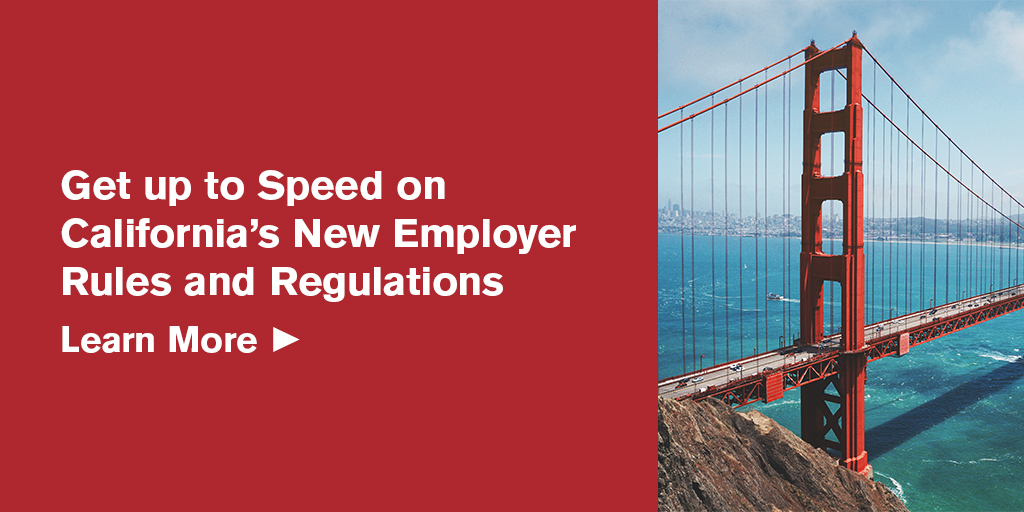January 1, 2020 changed the California employment requirements for Independent Contractors and employers alike. To help organization leaders and workers navigate the new 2020 employment laws, BPM’s HR and People Services team breaks down each of the significant changes and next steps.
AB 51 – Bans Mandatory Employment Arbitration Agreements
Summary:
AB 51 prohibits employers from requiring employees or applicants, as a condition of employment, continued employment, or the receipt of any employment-related benefit to “waive any right, forum, or procedure” for any claim under the Fair Employment and Housing Act (FEHA) and the California Labor Code. This applies to agreements “entered into, modified, or extended” on or after January 1, 2020. (Note: agreements signed prior to 1/1/20 may be fine – the law is unclear about this at this point.)
Violators of this law may be charged with a misdemeanor crime.
SB 142 – Lactation Accommodations
Summary:
This updated law (SB 142) provides new requirements for lactation space, breaks and recommends notices for employees. Employers with more than 50 employees must comply, and organizations with less than 50 employees have to prove a hardship and make reasonable efforts to comply. The law expanded as follows:
- Employers must provide a reasonable amount of break time to accommodate an employee desiring to express breast milk
- Employers must provide an employee with the use of a room or other location for the employee to express milk in private, meeting the following requirements:
- Cannot be a bathroom
- In close proximity to the employee’s work area, shielded from view, and free from intrusion
- Safe, clean and free of hazardous materials
- Contains a surface to place a breast pump or personal items (like a table)
- Contains a place to sit
- Has access to electricity or alternative devices (e.g. extension cord or charging station) needed to operate an electric or battery-powered breast pump
- Employers must also provide:
- Access to a sink with running water
- Refrigerator or another cooling device suitable for storing milk (e.g. an employer-provided cooler)
Denial of reasonable break time or adequate space to express milk constitutes as failure to provide a rest period, resulting in a penalty of one hour of additional pay for each workday the rest period was not provided.
New written policy requirements: Employers are required to develop and implement a policy regarding lactation accommodation, which includes:
- Statement advising employees of their right to request lactation accommodation
- The process for requesting lactation accommodation
- Employer’s obligations to provide a written response, if it cannot provide break time or a location compliant with the policy
- Statement about an employee’s right to file a complaint with the Labor Commissioner for any related violation
The policy must be included in the employee handbook or set of policies the employer makes available to employees. The policy must be also distributed to:
- New employees upon hire
- When an employee makes an inquiry about or requests parental leave
AB 749 Settlement Agreements
Summary:
Effective January 1, 2020, settlement and/or severance agreements can no longer include language that bars employees from seeking future employment with the employer, or any parent company, subsidiary, division and affiliate or as a contractor with the employer.
The only exception is if the employer has made a good faith determination that the employee has engaged in sexual harassment or assault. Additionally, employers are not required to employ or rehire a person if there is a legitimate non-discriminatory or non-retaliatory reason for terminating the employment relationship or refusing to rehire the person.
AB 5 Independent Contractors
Summary:
Effective January 1, 2020, California adopted the “ABC” test to determine employee vs. contractor status under California’s Wage Orders. The statute broadens the application to include California Labor Code and Unemployment Insurance Code. To be classified as an Independent Contractor, workers must meet all three of the tests below:
- The worker is free from the control and direction of the hiring entity in connection with the performance of the work, both under the contract for the performance of the work and in fact
- The worker performs work outside the usual course of the hiring entity’s business
- The worker is customarily engaged in an independently established trade, occupation or business of the same nature as the work performed
Note: If an Independent Contractor is misclassified there is legal exposure far beyond the many forms of pay penalties, including attorney fees and criminal liability for noncompliance. Personal liability for exercising control over noncompliant decisions and/or “advising” a misclassification.
Minimum Pay
Summary:
Non-exempt minimum wage changes have occurred, effective Jan. 1, 2020. The state minimum wage for employers with 25 or fewer employees has increased to $12 per hour from the current $11, and the state minimum wage for employers with 26 or more employees has increased to $13 per hour from the previous $12.
California: Exempt minimum salary (effective January 1, 2020)
- $54,080/year – employers with 26+ employees
- $49,920/year – employers with 25 or fewer employees
- $96,998.33/year – Computer Software Professionals ($46.55/hour)
For non-exempt positions, there are updates to many county and city ordinances that, in most cases, are higher than the California wage. The higher amount applies if you have employees in those cities.
SB 188 Hairstyle Discrimination
Summary:
Known as the CROWN Act (Create a Respectful and Open Workplace for Natural Hair), SB 188 expands the FEHA’s definition of race to include traits historically associated with race, such as hair texture and protective hairstyles. The bill defines “protective hairstyles” as “braids, locks, and twists.” The law prohibits workplace dress code and grooming policies that prohibit natural hair, including afros, braids, twists and locks.
AB 9 Extends the Deadline to File Workplace Complaints
Summary:
This law extends the time–from one year to three–in which employees are allowed to file complaints with the Department of Fair Employment and Housing for discrimination or harassment based on race, sex, age, disability, medical conditions, sexual orientation and other protected characteristics. Claims that have already expired under current law are not restored under AB 9.
SB 778 Extends Timeline for Small Businesses to Conduct Anti-Harassment Training
Summary:
This law modifies SB 1343, which requires employers with five or more employees provide supervisory employees with two hours of anti-harassment training. The law also requires non-supervisory employees at a company to receive one hour of training every two years as covered employers. While those provisions remain in place, SB 778 sets the deadline for initial training one year later to January 1, 2021.
SB 83 San Francisco Paid Parental Leave Extension
Summary:
Paid Parental Leave compensation will extend from six weeks to eight weeks for claims starting on or after July 1, 2020. The San Francisco Paid Parental Leave Ordinance requires employers to pay “supplemental compensation” for the full period a covered employee receives Paid Family Leave to bond with a child. When this period increases from six to eight weeks, all covered employers will be required to extend their Paid Parental Leave compensation from six to eight weeks as well.
IRS Issues New 2020 W4 Form
Summary:
For employees hired after 2019, and for existing employees who want to adjust their withholding after 2019, the 2020 version will be the only valid W4 Form. The new form contains major revisions, including new requirements for federal income tax withholding calculations, along with other items that new or additional information.
Notes:
- Because existing employees will not be required to complete the 2020 form, they can leave their 2019 or prior W4 and withholding allowances unchanged
- The 2020 version is mandatory only for new hires and employees who want to adjust their withholding or change other information after 2019
Summary of Changes to Contribution Limits
| Contribution Limits | 2019 | 2020 |
|---|---|---|
| Health Flexible Spending Accounts | $2,700/plan year | $2,750/plan year |
| Qualified Transportation | $265/month | $270/month |
| Parking Benefits | $265/month |
$270/month |
| Adoption Assistance Programs | $14,080/year | $14,300/year |
| Pension Plan Limits | 2019 | 2020 |
| 401(k) Plan or SAR SEP | $19,000/year | $19,500/year |
| 403(b) Plan | $19,000/year | $19,500/year |
| 408(p)(2)(E) Simple Plan | $13,000/year | $270/month |
| 457(e)(15) | $19,000/year | $19,500/year |
| 401/403/457 Plan Catch Up | $6,000/year | $6,500/year |
The above is a high-level overview of California’s 2020 employment legal changes. Contact BPM’s HR and People Services group today to gain a greater understanding of next steps for you or your organization to maintain compliance.
BPM for HR and People Services
BPM is one of the largest California-based accounting and consulting firms, ranking in the top 50 in the country. Let us help you change the way your workforce engages at work and how your company engages with your workforce. From complete HR outsourcing, consulting and recruiting to PEO transitions and an engaged culture, our HR and People Services group can scale up or down with your organization and help keep your options open from the beginning. Whether you need project based help, a long term partner, or just a nudge in the right direction, we have the expertise to deliver an effective and strategic solution to any HR challenge. Contact today by visiting https://www.bpmcpa.com/HR.
 January 1, 2020 changed the California employment requirements for Independent Contractors and employers alike. To help organization leaders and workers navigate the new 2020 employment laws,
January 1, 2020 changed the California employment requirements for Independent Contractors and employers alike. To help organization leaders and workers navigate the new 2020 employment laws, 


